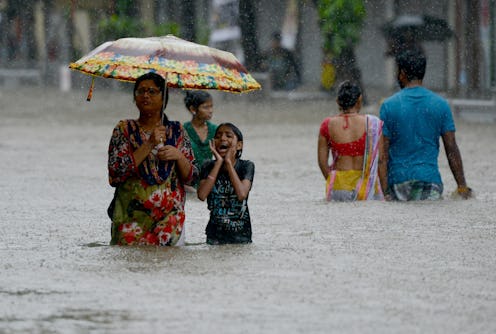News
South Asia Floods Are Killing Hundreds Of People & We Need To Talk About It, Too

For the past week, Americans have been focused on the devastation that Hurricane Harvey has been wreaking on Texas and now Louisiana. This is understandable; we are witnessing the tangible consequences of climate change manifesting in frightening ways. However, there has been significant flooding in other parts of the world, too, that we should know about. In the past month, for example, more than 1,200 people have died during floods in South Asia.
When a natural disaster strikes in the United States, we know about it immediately. We get in touch with our loved ones to make sure that they are OK, we share articles about it, and we send donations to local organizations if we are able to. This makes sense; when you live somewhere, you feel more directly affected by what happens there. However, people who are suffering far away are still suffering, and we should not distance ourselves from natural disasters happening in other parts of the world.
Our responsibility to pay attention to global natural disasters is multifaceted. Firstly, events like the floods in South Asia may not even be on many Americans' radar right now, but over 40 million people in India, Bangladesh, and Nepal have recently been affected by floods and landslides, and their lived experiences — their lives — are just as valid and important as our own. Secondly, climate change disproportionately impacts low-lying coastal communities around the world, especially poor communities and communities of color.
Climate change has placed the entire world in a perpetual state of emergency. Events that have minimal odds of happening in a given year — like the "500-year floods" in Houston following Hurricane Harvey — are growing increasingly frequent. South Asia — including Pakistan and Sri Lanka — is one of the most vulnerable regions to flooding, and the rate of extreme floods has grown with each passing year.
In the aftermath of Hurricane Katrina, it became more widely clear that the United States was not exempt from the dangers facing poor coastal regions. New Orleans is still recovering, especially the city's black and poor communities. We cannot have conversations about environmental justice without recognizing that poor people and people of color face a disproportionately greater risk from climate change — but this should also remind us to pay attention when climate change wreaks havoc in other parts of the world.
Whether a natural disaster strikes in the southern United States or in South Asia, the people whose lives are inevitably affected deserve our empathy and compassion. On a systemic level, they also deserve better. It is important for us to combat climate change in order to protect those who are most vulnerable to it. If we ignore flooding in South Asia because we cannot relate to it as easily, then we are dehumanizing the millions of people who are fighting for survival, and involuntarily minimizing their experiences.
Think about the tens of thousands of houses, schools, and hospitals that have been destroyed in the region, and how long it will take to reconstruct them. Think about the two toddlers who died in Mumbai, after intense flooding caused their home to collapse. Think about the people of Bangladesh — one-third of their country is reportedly underwater. Think about the flood survivors who are now having to contend with food shortages and increased risk of disease. They deserve to have their stories told and their experiences acknowledged. They also deserve the same generosity and kindness that we show when a natural disaster strikes the United States.
Combating climate change is not an abstract idea. We must put economic pressure on large corporations and lawmakers to curb carbon emissions. We need powerful people and institutions to starve the fossil fuel industry, to make it so unprofitable that climate-friendly alternatives become much more appealing. If we don't act now, the horrifying consequences of climate change — which we've already glimpsed on American coasts in the past couple decades — will no longer seem quite as far away.
There are parts of the world that are already at risk of being permanently submerged; in fact, some Pacific islands have already been lost to rising seas, and South Asia is going to be recovering for a long time. Let's not wait until we're underwater to finally take action.